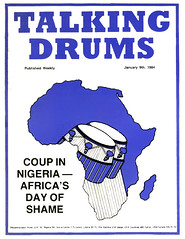What The Papers Say
Nigeria in its soldiers' grip
The Times, London
The economic weakness of the Shagari regime became dramatically apparent two days before the coup when the President introduced an austerity budget. Nigeria is a rich country, producing over a million barrels of oil a day, and it was an admission of failure for the government to be facing mountainous international debts and demanding the acceptance of hardship from its citizens.
The reason, of course, lies in the world slump in oil in the past two years. Before that Nigeria produced over two million barrels of oil a day, and it had arranged to spend (often on absurdly over-expensive and unproductive projects) on the assumption that its income would continue as before. The Shagari government is convicted of being slow to react to changed circumstances.
RIGGING OF RESULTS
More damaging is the aura of corruption that has grown around the government, in spite of President Shagari's personal rectitude and efforts to bring about an "ethical revolution". Politicians of almost all parties have allowed the impression to grow that a large part of their political motivation was to pursue private gain. They began by voting themselves inflated pay and allowances at state and federal levels, and went on to be dubiously involved in the awarding of contracts, and so on. The sight of politicians who have grown fat in office calling the general populace to austerity was contemptible.The working of democracy itself could also be called into question. In August last year the President and his party received in a reasonably peaceful election what seemed to be a resounding mandate for a second four-year term in office. But there was convincing evidence of large-scale rigging of results: the registration of voters was high beyond belief in some places and the variations in voting patterns, between presidential and state governorship elections, which were one week apart, also lacked credibility.
However, none of this amounts to an adequate reason for a military seizure of power. Democracy might have been faltering, but it was not dead. Opposition parties won power in seven of the 19 states in the federation. In the most blatant case of rigging by the governing party, in Ondo state, the results were overturned by the courts. Political parties were thinking about and planning the next elections in 1987. President Shagari would not have been allowed to stand again and the opposition parties were working on new alliances. Nothing was certain. As democracies in Britain and America survived their Eatanswills and Huey Longs, so democracy in Nigeria could have survived its 1983.
The last time democracy fell to military power in Nigeria, in 1966, there was more excuse for the soldiers in that law and order were breaking down, police had been forced to invade the Western Region assembly, elections had been boycotted and the workings of democracy were more thoroughly discredited. Nevertheless, and in spite of the fact that Nigerian military leaders were of a higher calibre than some others in Africa, Nigerians do not look back with pleasure on the 13 years of military rule that followed 1966.
TEST BED
The freedom that was absent then and has now been lost again is not an abstract, unimportant thing. Nigerians delight in passionate political debate; the press has been since 1979 the most free in Africa healthily, abusively irreverent towards those in power. In the renowned Shugaba case in 1980 a leading citizen of Borno state was suddenly deported by the police because one of the President's ministers believed he was not a Nigerian. The man was able to obtain restitution and damages from the courts. A military regime does what it likes.There is a larger dimension. The return of democracy to Africa's most populous nation was done with infinite care by the military in the late 1970s, with a constituent assembly poring long over the details of an appropriate constitution and the government sticking strictly to its announced timetable. It was watched with close and hopeful attention by the rest of Africa and the world. Nigeria was a test bed. Could the tender plant grow into a sturdy tree? Could this be an answer to the South Africans, who so often insist that democracy is not suited to African conditions? The answer would seem to be "no".
HOPELESS PROGNOSIS
Britain is commercially affected because Nigeria in good times is our biggest trading partner outside Europe and the United States. We are at the moment owed hundreds of millions of pounds (the exact amount, like all Nigerian statistics, is in doubt). Britain is emotionally involved too, having a shared history, and there are about 20,000 Britons working in Nigeria.The prognosis is not made more hopeful by the fact that December 31 happened to be the second anniversary of the coup in Ghana in which Flight-Lieutenant Jerry Rawlings brought an end to a similar democratic experiment. Ghana has since moved from poverty to destitution. It has also faced at least three major attempted counter-coups.
This illustrates the final discouraging lesson of the Nigerian coup. If a man with a gun and a military following can impose his will on a nation when he disagrees with the actions of the elected government, then another man with a gun and a military following is entitled to replace the present ruler when things become too much for him in his turn. Major-General Mohammed Buhari and his friends have much to answer for.
